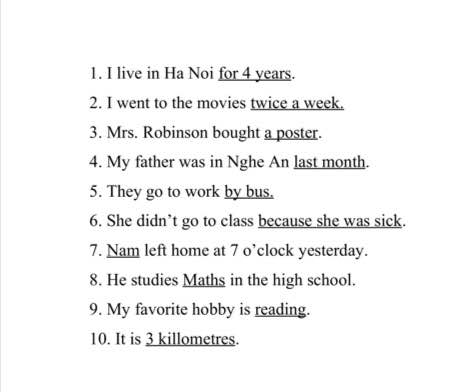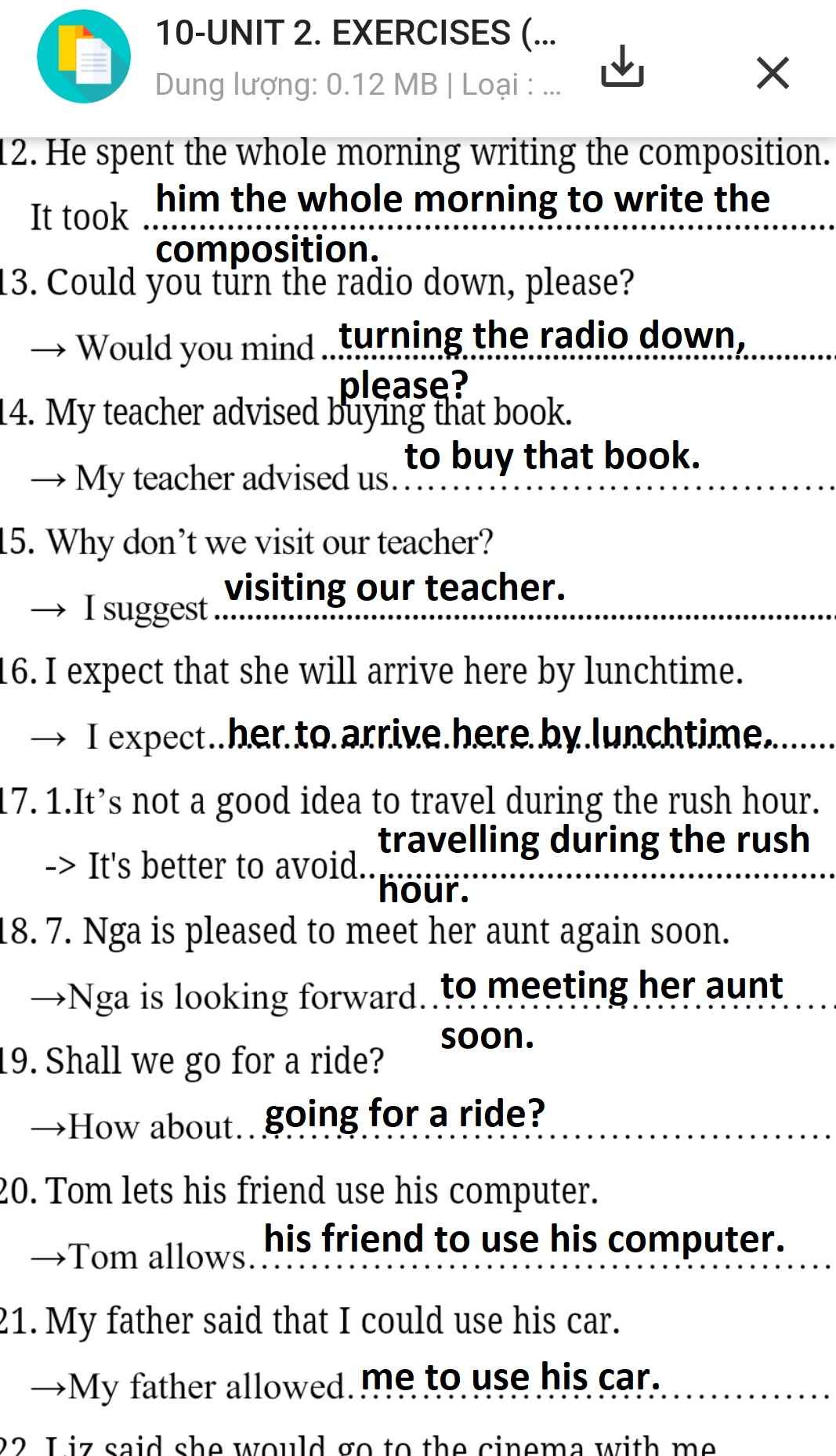Supply either the infinitive or gerund of the verbs in parentheses.
Giúp em vs ạ
Unit 2: SCHOOL TALKS
1 listening
2 camping
3 to be
4 to speak
5 to pay
6 to meet
7 not trying - to solve
8 being
9 hunting
10 to be
11 working
12 going
13 to do
14 to bring
15 working
16 buying
17 to inform
18 studying
19 to buy
20 to be fed
21 working
Đúng 1
Bình luận (1)
Giúp em vs ạ
1 C
2 A
3 C
4 D
5 D
6 B
7 D
8 B
9 D
10 A
11 B
Đúng 1
Bình luận (0)
Giúp mình với mình đang cần gấp mong mn làm giúp mình ạ
1 How long do you live in HN
2 How often did you go to the movies
3 What did Mrs Robinson buy
4 When was your father in Nghe An
5 How do they go to school
6 Why didn't she go to class
7 Who left home at 7o'clock yesterday
8 What subject does he study in the high school
9 What is your favorite hobby
10 How far is it
Đúng 1
Bình luận (1)
6. Before she ( listen)________ to music, she(do)_________homework.
7. Last night, Peter (go)_________to the supermarket before he(go)________home.
8.We_________this bike before 1975(use).
9. They________ their work by 7.00 yesterday(finish)
10. It rained yesterday after it (be)_________ dry for a month. ( Giải thích tại sao dùng từ đó)
6. listened- had done (before S Vp1, S Vp2)
7. had gone - went (tương tự)
8. have used (HT Hoàn thành)
9. had finished (QKHT - dấu hiệu: by 7:00 yesterday)
10. had been (S Vp1 after S Vp2)
Đúng 1
Bình luận (0)
listened / had done
went / had gone
used
finished
had been
Đúng 1
Bình luận (0)
6. Before she ( listen)____listened____ to music, she(do)____had done _____homework.
7. Last night, Peter (go)__had gone_______to the supermarket before he(go)____went____home.
=> cấu trúc: before+ S+ Ved , S + had VIII
8.We____used_____this bike before 1975(use).
9. They___finished_____ their work by 7.00 yesterday(finish)
10. It rained yesterday after it (be)__had been_______ dry for a month.
Đúng 1
Bình luận (1)
Giúp mình với mn
Giải giúp mình với mn
1 Where do they stay
2 How long is this ruler
3 How often does she go to the supermarket
4 What is lan playing
5 Who went to VN in 2000
6 What did Mr Robinson buy
7 Where was Lan's father last month
8 How do you go to school everyday
9 How long does it take him to go to school by bike
Đúng 2
Bình luận (0)
1. he______ his arm when he ______ football.(break, play)2. Julia_______ her first novel when she _____ 19 years old( write, be)3. I_______ on the computer when the fire _______ out( work, break)4. when it_______ to rain, they________ though the forest( start, walk)5. he ________ us about his marriage when we ___________ afternoon tea( tell, have)6. sorry, i_________ to you. I_________ about something else( not listen/ think)7. I_______ you last night, but you _________ what _________you________...
Đọc tiếp
1. he______ his arm when he ______ football.(break, play)
2. Julia_______ her first novel when she _____ 19 years old( write, be)
3. I_______ on the computer when the fire _______ out( work, break)
4. when it_______ to rain, they________ though the forest( start, walk)
5. he ________ us about his marriage when we ___________ afternoon tea( tell, have)
6. sorry, i_________ to you. I_________ about something else( not listen/ think)
7. I_______ you last night, but you _________ what _________you________?( phone , not answer, do)
8. Mary ________ her glasses at the tim e, so she __________ what kind of car the man __________( not wear/ not notice/ drive)
1. he___broke___ his arm when he ___was playing___ football.(break, play)
2. Julia___wrote____ her first novel when she ___was__ 19 years old( write, be)
3. I____was working___ on the computer when the fire ____broke___ out( work, break)
4. when it____started___ to rain, they__were walking _____ though the forest( start, walk)
5. he ______told__ us about his marriage when we ______were having_____ afternoon tea( tell, have)
6. sorry, i____haven't listened _____ to you. I____have been thinking_____ about something else( not listen/ think)
7. I_____phoned__ you last night, but you ____didn't answer_____ what _____were____you___doing_____?( phone , not answer, do)
8. Mary _____wasn't wearing___ her glasses at the tim e, so she ______didn't notice____ what kind of car the man ____was driving______( not wear/ not notice/ drive)
Đúng 1
Bình luận (0)
He went to school by bike
By working in groups, you (1) __________ experience and understanding about how tasks are often undertaken in the workplace. The successful completion of a group (2) __________ usually means that you have mastered many very important skills, particularly communication, analytical and interpersonal skills, which are (3) ________ valued by employers. The abilities to listen, question, persuade, respect the opinions of others, help, share and participate are of (4) ________ value.Working with other...
Đọc tiếp
By working in groups, you (1) __________ experience and understanding about how tasks are often undertaken in the workplace. The successful completion of a group (2) __________ usually means that you have mastered many very important skills, particularly communication, analytical and interpersonal skills, which are (3) ________ valued by employers. The abilities to listen, question, persuade, respect the opinions of others, help, share and participate are of (4) ________ value.
Working with others also allows for assignments to be broken into (5) _________ and the workload to be distributed. By working (6) __________, students are able to bounce ideas off each other and learn from each other. Members can contribute different skills and thus the group can achieve more than what (7) ___________ members could on their own.
Often you will have an opportunity to select whom you will work with but sometimes, particularly if you are an off-campus student, this decision will be made for you. If you have not previously met the other members of the group, spend some time (8) _________ to know each other. Invite members to talk about themselves and (9) ___________ addresses. You may find that you will be working with students from interstate, overseas and from a (10) ________ of backgrounds and interests. Build a good working relationship.
1. A. get B. gain C. have D. take
2. A. assignment B. homework C. performance D. exercise
3. A. mostly B. likely C. highly D. totally
4. A. increasing B. novelty C. market D. lifelong
5. A. tasks B. pieces C. shares D. projects
6. A. one another B. with other C. together D. each other
7. A. each B. individual C. all D. lots of
8. A. get B. getting C. to get D. got
9. A. give B. exchange C. write D. take note
10. A. lots B. research C. variability D. diversity








